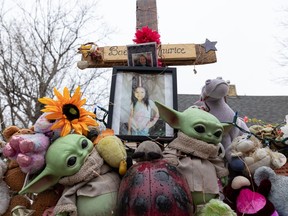The decision quashed the defence’s attempt at a constitutional challenge at Taylor Kennedy’s THC-impaired driving causing death trial in Saskatoon.

Article content
When Taylor Ashley Kennedy told a police officer that she used cannabis and psilocybin (mushrooms) the night before a fatal crash, she likely did so because she wanted to help the little girl she had just hit, not because she thought it was the law, a Saskatoon provincial court judge has ruled.
“I am not convinced on a balance of probabilities that Ms. Kennedy had a subjectively honest and objectively reasonable belief that she was statutorily or otherwise compelled to report anything” when it came to her recent drug use, Judge Jane Wootten concluded on Friday.
Advertisement 2
Article content
Her decision quashed the defence’s attempt at a constitutional challenge. Defence lawyer Thomas Hynes argued that the statements were statutorily compelled under the Traffic Safety Act, and the law that compels someone to make a statement after a collision, for the purposes of justifying a blood demand or oral swab test, breaches a person’s right against self-incrimination.
Kennedy, 29, was allowed to appear by phone for the decision at her judge-alone trial, which has been in a blended voir dire — admissibility hearings within trials — to deal with several charter issues raised by her defence team since October 2023.
She was charged in 2022 with impaired driving while exceeding the prescribed blood-drug concentration of THC causing the death of nine-year-old Baeleigh Emily Maurice.
Kennedy admits hitting Maurice as the girl entered a crosswalk on her scooter at the corner of 33rd Street and Avenue G around 9 a.m. on Sept. 9, 2021.
At the crash scene, Kennedy repeatedly told officers that it was an accident.

Court heard she first disclosed her drug use to Const. Shelby McLean, an officer who was asked to stay with Kennedy at the crash scene as another officer, Const. Blake Atkinson, retrieved a USB.
Article content
Advertisement 3
Article content
Testifying at her voir dire in April, Kennedy said she did so because she thought it was the law.
Wootten said she believed McLean’s testimony that she wasn’t trying to take a report from Kennedy, but rather was trying to console her. She said she informed Kennedy that police usually take statements after an accident to determine if a driver has been drinking alcohol “or something.”
Kennedy then told her she had vaped cannabis and microdosed mushrooms the night before, to which McLean asked, “But not today?”
McLean said she wasn’t trying to induce any statements from Kennedy, and did not try to obtain more information after her disclosure.
The utterances were made before Kennedy was taken into the back of a police car to give an audio and video-recorded statement to Atkinson, who asked Kennedy about her drug use based on the information Kennedy gave McLean.
Atkinson said before he left Kennedy with McLean, he informed her that at some point she would be required to give a statement for an accident report. Kennedy agreed that an officer told her the statement would begin once she was in the police car.
Advertisement 4
Article content
Statutorily compelled statements are protected under the Charter, Wootten said. A driver has an interest in knowing when they have to speak, and when they have the right to remain silent.
There needs to be a clear differentiation between taking an accident report and a Criminal Code report, Wooten said before making her decision.
She has yet to rule on whether Kennedy’s statements about drug use will become admissible at trial.
The case has been adjourned to June 11 to choose a day for arguments on the remaining charter issues at play, including delay, detention and right to counsel.
Recommended from Editorial
The Saskatoon StarPhoenix has created an Afternoon Headlines newsletter that can be delivered daily to your inbox so you are up to date with the most vital news of the day. Click here to subscribe.
Article content






